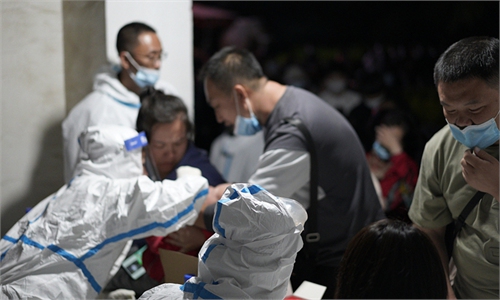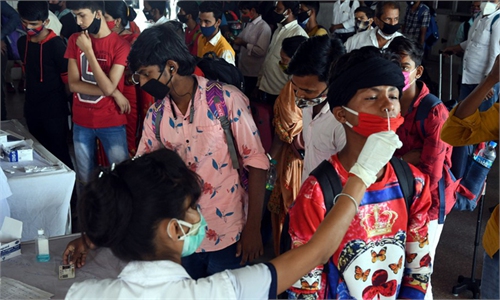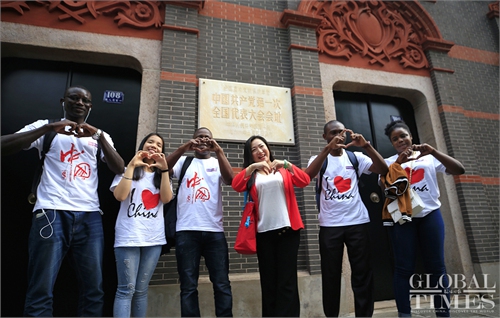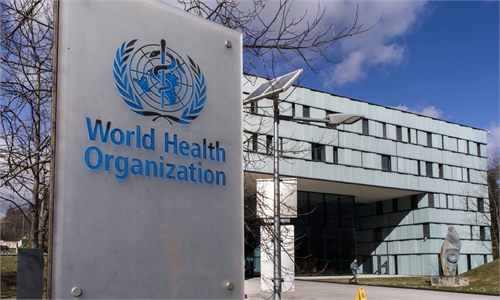Battling behind the scenes: US pressuring WHO on coronavirus origins tracing
Politics or science? Washington exploits virus origins, pitting global scientists against political motives
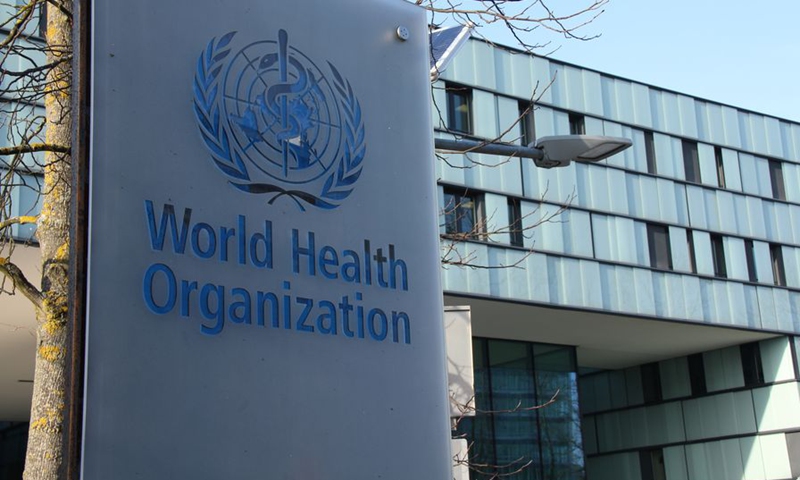
Photo taken on Jan. 22, 2020 shows an exterior view of the headquarters of the World Health Organization (WHO) in Geneva, Switzerland.
Upholding the true spirit of science, valuing facts and advocating for solidarity rather than confrontation in face of the pandemic should be a major lesson learned from the past year and shared at the ongoing 74th World Health Assembly (WHA), however, the US, exploiting its return to the WHO under the Biden administration, is turning the pivotal meeting, supposed to summarize the virus-fight experiences, into a battleground between science and politics.
By hyping the extremely unlikely hypothesis about the origins of COVID-19, misquoting preeminent experts in origins studies and coming up with groundless reports that have been refuted by Chinese officials and experts repeatedly, the Western media, along with some US politicians and government agencies, are now putting scientists in an awkward and embarrassing position, as some have been struggling to find more facts about the virus in a highly politicized environment, according to people familiar with the matter.
Washington has called for a new round of studies to be conducted with independent and international experts at the WHA on Tuesday as Andy Slavitt, White House senior adviser for the COVID-19 response, was quoted as saying in the Wall Street Journal that "we need to get to the bottom of this and we need a completely transparent process from China. We need the WHO to assist in that matter. We don't feel like we have that now."
It is no surprise to some observers that the US delegation brought up again a request to return to China to conduct origins studies, given it was one of the tricks of the former US president Donald Trump in shifting the blame to China for his own failed pandemic handling, and blaming China on the question of the virus origins is one way to reach this goal.
Just hours before this year's WHA began on Monday, the WSJ ran a story citing an undisclosed US intelligence report that indicated three researchers from the Wuhan Institute of Virology became sick in November 2019, with symptoms consistent with both COVID-19 and common seasonal illnesses, fueling the debate about the origins.
Dutch virologist Marion Koopmans, a member of the WHO-China joint team on the origins study earlier this year in Wuhan, Central China's Hubei Province, said a follow-up trip could be helpful to gather additional research on the origins of the disease, comments made after the US called for a new round of studies, according to Reuters.
Koopmans said the team would be eager to carry out additional research in China in a number of areas and it was awaiting the outcome of WHO discussions, Reuters said.
While some observers wonder whether the latest remarks of the scientist, who took part in the earlier origins study in Wuhan would be taken by some Western media and officials as backtracking on her words and even an implication about the interference of the Chinese government in their earlier field studies, the Global Times learned from some people familiar with the matter that both Chinese and foreign scientists who took part in the study have been facing growing political pressure in recent months.
Battle behind the scene
Koopmans clarified in an email to the Global Times on Wednesday the follow-up studies on the coronavirus origins she called for should be a combination of studies that start where the WHO-China joint team left off, so that means studies in China and outside of China.
The studies should look at regions outside China that have reported "viral sequences very early, in 2019, like Northern Italy," as recommendations in the joint study report called for studies in regions where viruses are almost identical to the first detected viruses from Wuhan, Koopmans said.
She also said there is also a need for more surveys of bats, particularly in China's neighboring countries.
The suggestion is in line with a joint WHO-China report following the studies in Wuhan, which further suggests that animals in livestock farms in Southeast Asia could be "linked to early human cases" and that further study on these farms is needed.
An expert from the China-WHO joint team acknowledged to the Global Times on Monday that the latest WSJ report about the Wuhan lab is purely political, which echoed US government's attempts to further smear China's efforts in the anti-epidemic fight and continuing its "shift-the-blame" strategy.
As early as March before the report of the investigation in China was released, Chinese experts involved in the issue reached by the Global Times said that they felt palpable "political pressure" on the international experts. A Chinese expert from the joint team told the Global Times in an earlier interview that the Chinese side did not know "exactly who is putting pressure on the international experts," which could be coming from several countries.
The invisible "pressure" formed following the US' signal of their return to the WHO in January after the Biden administration took office and later in February, it announced it would pay the millions of dollars it owed to the WHO, a Chinese professor on US studies who preferred not to be identified, told the Global Times on Wednesday.
Subsequently, there were unexpected "interludes" that kept occurring between China and WHO cooperation, which used to move smoothly in 2020 during the US' absence in the organization, he said.
It was not only the experts from the joint team feeling the pressure from the outside, Tedros Adhanom Ghebreyesus, the WHO chief, also made some comments about the matter that aroused discontent from the Chinese side.
After Tedros commented earlier in April that further investigation is needed on the hypothesis of a "lab leak" being the origins of the COVID-19, a theory that has already been determined by the WHO-China joint expert team as being extremely unlikely, an anonymous Chinese expert on the WHO-China joint team told the Hubei Daily that he was "surprised and unsatisfied" by Tedros' comment, calling his comment "irresponsible."
China has called for the return of the US to the World Health Organization (WHO) with a "serious, earnest, transparent and responsible" attitude to contribute to international cooperation against the pandemic, but the US seemingly is making the issue more complex and a political struggle as "the US and China are split" over the origins and "experts call for new research in China" made the headlines in Western media on Wednesday following the assembly's discussion over the investigation into the origins of the virus the day before.
In the past two months following these moves, international cooperation in tracing pandemic origins had grown into a game between politics and science, a source close to the issue told the Global Times under the condition of anonymity, noting that he can understand that some foreign experts and WHO officials showed change in their expressions and attitude to China over affairs related to the trace to the origins of the virus, as it is hard to strike a balance in this game.
What's next?
In a reply to the Global Times inquiry on Wednesday, the WHO said it is reviewing the recommendations from the virus origins studies report at the technical level.
"The technical teams will prepare a proposal for the next studies that will need to be carried out, and will present that to the Director-General for his consideration," read the reply.
Feng Zijian, Deputy Director-General of the Chinese Center for Disease Control and Prevention (China's CDC) who is also an expert on the WHO joint team, told an earlier briefing on March 26 that the source-tracing work of the WHO-China joint team in Wuhan, part of the global work of studying the virus origins, has been finalized with a consensus that this scientific work cannot be done overnight.
He emphasized that the WHO-led origins-tracing work requires efforts on a global scale, of which China is just a part, and that is the consensus of the Chinese and the foreign experts on the joint team.
With more evidence of early cases emerging in other countries, including the US, Spain, Italy, France, Brazil and India, some even earlier than the cases reported in Wuhan, several preeminent Chinese public health experts have called for the WHO to follow the evidence trail and continue carrying out global field studies in the coming months.
According to the clues, reports and researches, the COVID-19 pandemic was spotted in various places around the world early in the second half of 2019, Zhao Lijian, Chinese Foreign Ministry spokesperson Zhao Lijian told a routine press conference on Wednesday.
China takes the origins-tracing work seriously with a responsible attitude, and has made positive contributions that are widely recognized. If the US side truly demands a completely transparent investigation, it should follow China's lead to invite the WHO experts to the US, open Fort Detrick and biolabs overseas to the rest of the world, and disclose the detailed data and information on the unexplained outbreaks of respiratory disease in northern Virginia in July, 2019 and the EVALI outbreak in Wisconsin, the official noted.
"We urge the US and other relevant countries to cooperate with the WHO in a scientific, open and transparent manner," Zhao said.


